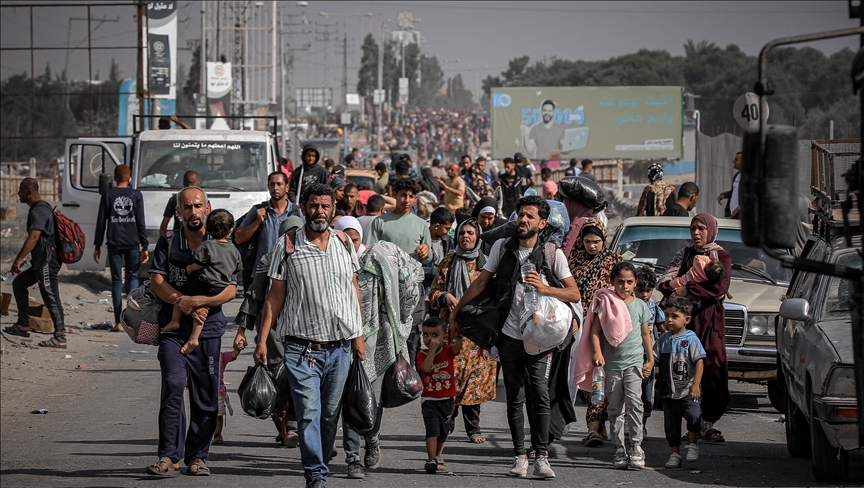Displaced by Israel, elderly Palestinian woman relives ‘new Nakba’ in Jenin
Khadra Abu Serriah, 90, displaced from Jenin refugee camp by Israeli forces amid deadly assault in West Bank
 Gaza Strip
Gaza Strip
JENIN, Palestine / ISTANBUL
Elderly Palestinian Khadra Abu Serriah still remembers the moment she was expelled from her home 77 years ago after the founding of Israel in 1948.
The 90-year-old woman’s experience recurred again when Israeli forces expelled her from her home in the West Bank city of Jenin amid a deadly onslaught north of the occupied territory.
“I want to return to my home in Jenin and die there,” Abu Serriah told Anadolu on Thursday.
The Palestinian woman is one of 40,000 Palestinians who were forced to flee Jenin, Tulkarem, and Nur Shams refugee camps in the northern West Bank, where the Israeli army has launched a deadly offensive since January, according to the UN agency for Palestinian refugees (UNRWA).
Palestinians call Israel’s policy of forcible displacement and land seizure a “new Nakba” or catastrophe.
Palestinians mark on May 15 the 77th anniversary of their expulsion from their towns in historical Palestine after Israel’s creation in 1948. These events, which saw thousands of Palestinians killed and hundreds of thousands displaced, are known as the Nakba.
1948 expulsion
The elderly woman said she was first expelled from her home in the town of Zirin, north of Jenin, by Zionist gangs in 1948 when she was 13 years old.
“We were forced to flee after massacres committed by Zionist gangs against Palestinian civilians,” she recalled.
After fleeing Zirin, her family settled in the Jenin refugee camp in the northern West Bank.
“Our town was destroyed and turned into a pile of rubble by the armed Zionist gangs,” she said.
“After the Nakba, we visited the town. It was just a pile of rubble. Everything was demolished; we had nothing but our memories.”
The Geneva-based Euro-Med Human Rights Monitor calls the Israeli policy of destroying Palestinian towns in Gaza and the West Bank “urbicide” to prevent the return of displaced residents to their areas.
“The Jenin camp means everything to me. I have my loved ones and neighbors there, our lives are dependent on this place," Abu Serriah said.
Hardest displacement
Though she was forcibly displaced from her home several times since 1948, Abu Serriah sees her latest displacement from Jenin as the “hardest” of all.
“We were forcibly displaced from the Jenin camp without anything; we had not taken anything with us,” she said.
“I only left with the clothes I’m wearing now, a plastic bag of my medicine, my ID, and an UNRWA card; that is all.”
Abu Serriah points at her home from the balcony of a relative’s home and says, “Here it is in front of my eyes, but I can’t reach it.”
"I look at the camp from afar, and whoever tries to reach it is shot by the Israeli army,” she said.
Despite her suffering, the Palestinian woman remains defiant.
“We will not abandon our land, I will die here and will not leave it. The Jenin camp means everything to me.”
At least 966 Palestinians have been killed and over 7,000 others injured in attacks by the Israeli army and illegal settlers in the West Bank since the start of the Gaza war in October 2023, according to Palestinian figures.
In July 2024, the International Court of Justice declared Israel's decades-long occupation of Palestinian land illegal and demanded the evacuation of all existing settlements in the West Bank and East Jerusalem.
Anadolu Agency website contains only a portion of the news stories offered to subscribers in the AA News Broadcasting System (HAS), and in summarized form. Please contact us for subscription options.







